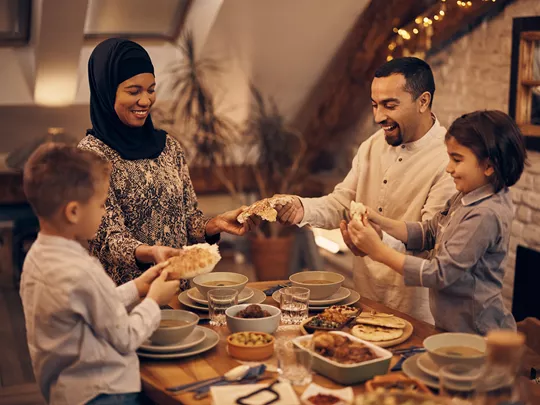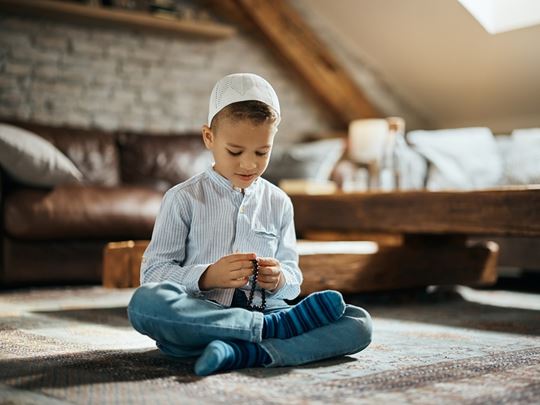This year, the holy month of Ramadan began on Wednesday 22nd March and will end on Friday 23rd April.
During this time, Muslims all around the world aim to grow spiritually and build stronger relationships with Allah. They do this through fasting, prayer, reciting from the Quran, and making sure their actions are intentional and selfless, like treating people with kindness and donating to charity.
While Ramadan is about reflection, sacrifice and self-discipline, it’s also a time for joy, celebration and togetherness. Families decorate their homes with lanterns and celebratory wreaths, and prepare the table to encourage happiness and spirituality. Mosques come alive as communities gather to pray, share food, and connect with one another. And individuals are rewarded with strengthened relationships by visiting family and friends, speaking to distant relatives on the phone, and giving thoughtful gifts.

Children in foster care and Ramadan
As with many religious festivals that are centred around family traditions, Ramadan can be a difficult time for Muslim children in foster care. It can bring up traumatic or distressing memories, or cause feelings of sadness, anger and loss as they celebrate away from their family. Some children may experience intense feelings of guilt for being happy and enjoying new traditions with their foster family. And those children living with families who don’t celebrate Ramadan may even try to minimise their beliefs and traditions in order to fit in.
Every child will have different needs, desires and traditions, and so it’s important that as a foster parent, you tune into these needs, and create a safe, inclusive and supportive environment for your young person to observe Ramadan in the way they choose.
Here are five ways that you can support a child in your care who may be celebrating Ramadan this year…
1. Speak to your child about their faith
Some young people in foster care may wish to continue to practice their faith. Others may prefer to distance themselves from it. That’s okay too.
The most important thing you can do as a foster parent is to find out how they feel about their faith at this moment, and what input they want from you. This is particularly important if they’re spending their first Ramadan with you.
2. Incorporate their family traditions
Speak to your child about how they celebrated Ramadan with their own family. You could ask them:
- How did you celebrate Ramadan with your family?
- Are there any traditions you would like to still do?
- Is there anything that you didn’t do with your family that you would like to do?
Together, you’ll create new memories for your child while also making space for their birth family’s traditions. This will help the child in your care feel accepted for who they are.

3. Learn some verses from the Quran used in prayer
If you don’t celebrate Ramadan but care for a child who does, then you could try to learn some of the verses from the Quran that are used in prayer. This could even be done as a family activity with the child in your care, plus anyone else living in your home.
You can also accompany them to your local mosque, so you can connect with others from their religious community.
Showing an interest in your child’s faith will help them feel comfortable to be their true authentic self, and engage in their religion without fear of judgement.
We have a whole range of resources to help foster parents who are fostering a child from a different race or religion.
Islamic prayer
‘Salah’ is an obligatory form of Islamic prayer that is performed five times per day during the following times:
- Fajr – before dawn
- Dhur – at noon
- Asr – in the afternoon
- Maghrib – sunset
- Isha – nightfall
Salah involves some physical movements, such as bowing down and standing, reciting verses from the Quran, and a number of supplications. But it can only take place once a cleansing ritual called ‘wudu’ is performed.
4. Discuss fasting with your child and social worker
Once a Muslim child hits puberty (around 12 years old), they are expected to take part in a month-long fast, from sunrise to sunset, during the holy month of Ramadan. Of course, this should be entirely up to your young person and whether they would like to take part.
It’s important to understand that many young people are placed in foster care due to a history of abuse and neglect. In many cases, food would not have been consistently available, or it was withheld or used as a form of punishment. This can lead to disordered eating behaviours in children in care, such as hoarding, binge eating, and more. You should speak to your social worker and therapy team to make sure you create an environment that allows the child in your care to fast safely, if they wish to do so.
If your young person chooses not to fast, then that is perfectly fine too. There are lots of other spiritual activities that they can do to help feel connected to their faith, like reading the Quran, performing prayers, making thoughtful gifts for family members, and engaging in acts of kindness and charity.
5. Celebrate Eid al-Fitr
Eid al-Fitr marks the end of Ramadan. This year, it will likely be celebrated on Friday 21st of April, depending on the moon sighting which ends the holy month.
Ahead of the festival, you should speak to your young person about what you usually do for Eid (if you observe Ramadan, of course), and how they would like to celebrate the occasion.
Together you might decide to start the day with Eid prayer at dawn at your local mosque, followed by a low-key family gathering where you all get dressed in your best clothing, eat a banquet of your favourite traditional foods, and exchange some gifts. Others may wish to attend a local community event or gathering, with food, prayers and stalls.
If you don’t typically observe Ramadan but want to make this year special for your young person, then here are some ways that you can celebrate Eid with kids.
